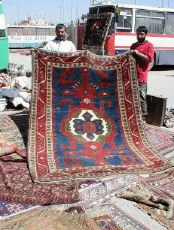From Dagestan with Rugs, Night-Vision Goggles and Honey
AMMAN, April 4 (AFP) - When Dagestani pilgrims like Hashem Ali are not performing one of the five daily Muslim prayers, they drive a hard bargain selling Caucasian rugs, honey and Russian army surplus night-vision goggles.
Ali is among dozens of Dagestani Muslims who have been visiting Jordan regularly over the past few years on their way to and from Mecca, Saudi Arabia, for the annual hajj or pilgrimage to Islam's holiest sites.
|
Two Dagestani pilgrims sell Caucasian rugs at the Amman international fairgrounds in Amman 01 April 2000 |
These pilgrims travel from their small Russian republic tucked away between the Caucasus and the Caspian Sea in battered buses through rugged terrain making stops along the way in Azerbaijan, Iran, Iraq, Syria, Turkey and Jordan where most set up camp.
They lease the bus for 3,000 dollars and finance the trip by selling an incredible array of products bought in Dagestan but also on their other stops.
Armed with hand-held calculators, tenacity and a limited vocabulary of Arabic and English words, they sell hand-knitted mittens and coarse woollen socks, cheap Chinese electronic products, fox-tail collars clenched claws and all, crystal glasses, Indonesian-made nylon underwear.
But it is the plush Caucasus and Iranian rugs that most shoppers come for hoping each time they will hit on a real, rare bargain or for the jars of golden honey the sweet-toothed Jordanians seem to crave.
The rugs, piles and piles of them, come in all sizes and colors. There are garish ones and others in subdued hues, modern kilims and century-old saddle bags, small prayer rugs to huge Sumaks.
All of them purported by their vendors to be "antiques".
"There is no work in Dagestan and even those who have work are underpaid or must wait six to seven months before they can collect their paycheck," said Abdel Sadek, a 30-year-old, student of Arabic.
"It is a tough life in all of Russia. Taxes are too high. These trips allow us to make the pilgrimage to Mecca and earn some money," he said, stressing that most often the hajjis hardly break even.
The pilgrims usually display their wares in parking lots adjacent to mosques or at the Amman International Fairgrounds just south of the capital, where this year some were bold enough to display Russian weapons.
"Haram, Haram (illicit under Islam)," a bearded Dagestani man with a white cap on the head is overheard telling a Jordanian client looking for rifles.
But other pilgrims are less scrupulous.
A pair of night-vision goggles attached to an aviator-type cap, with a wire extension that can be hooked up to a car lighter for illumination, is the prize item in Mohammed's display which also includes many telescopic sights.
"Russia. Very Good," Mohammed said, inviting a curious onlooker to try on the contraption. Then he pushed his calculator forward and flashed the figure 100 to indicate the cost in dollars.
Telescopic sights are sold between 25 and 50 dollars while red-lens, camouflage binoculars fetch 21 to 28 dollars, depending on the size.
A Jordanian school teacher who has bought Ali's rugs the past couple of years -- and resold them for a profit to rug dealers in Amman and Damascus -- says Ali has 40 hunting rifles for sale but that he keeps them under wraps to avoid getting into trouble like some pilgrims did in Saudi Arabia.
The Russian embassy in Riyadh reported that Saudi police arrested 59 Dagestani pilgrims in Mecca this year who tried to sell swords, night-vision goggles and hunting rifles to fellow Muslims.
But they were later released "in an act of tolerance" by Saudi authorities to allow them to complete their pilgrimage.
Every able-bodied Muslim with the financial means is required to make the hajj at least once in a lifetime.
Muslims were prevented from making the pilgrimage under the Communist regime of the former Soviet Union but since its collapse, they have hit the road in their battered buses to pray and do business on the side.
Ali, who earns the equivalent of 40 dollars a month at home driving buses or trucks, selling carpets, walnuts, milk and honey is on his seventh pilgrimage. He came with his wife leaving at home four small children.
He hopes to be back next year and the next as long as there are clients for his carpets.


















